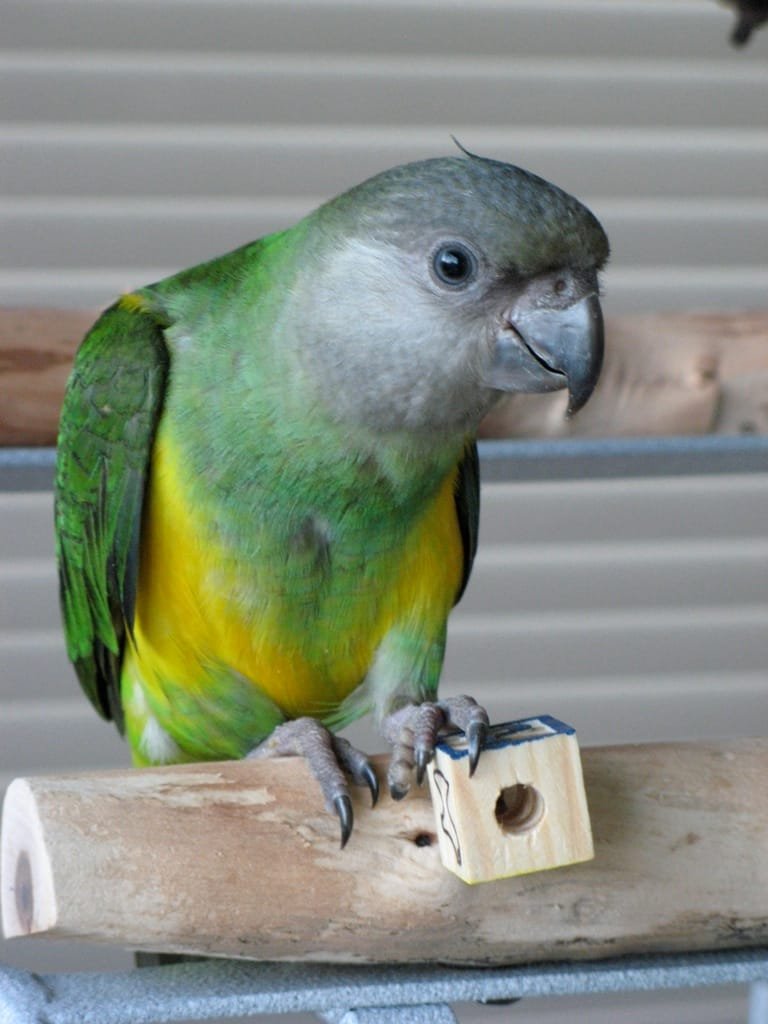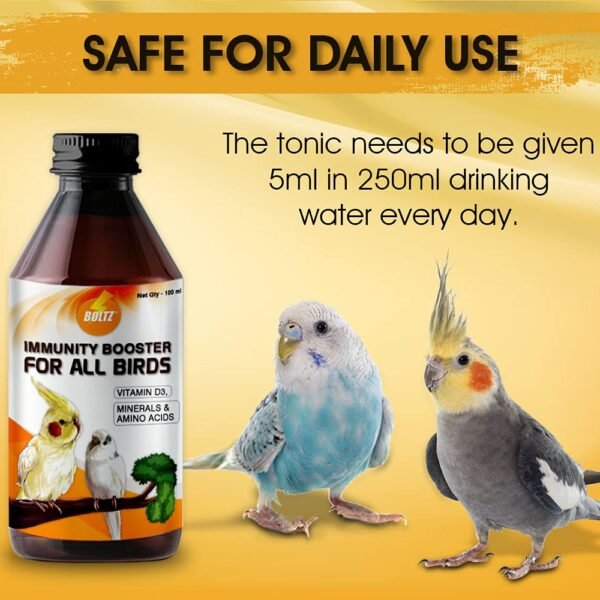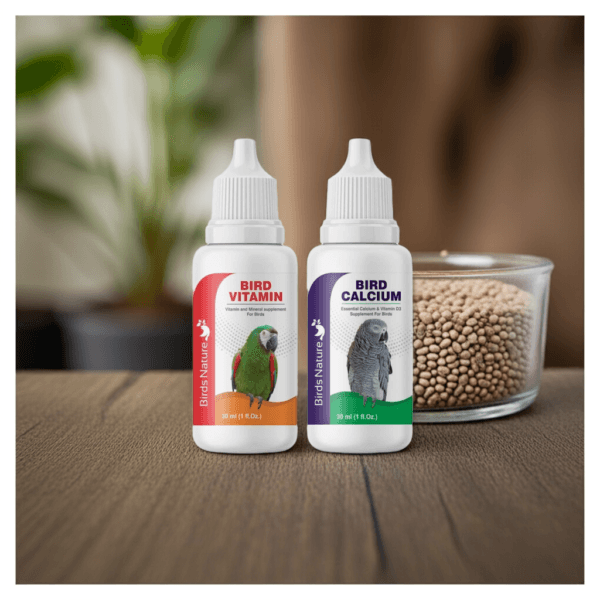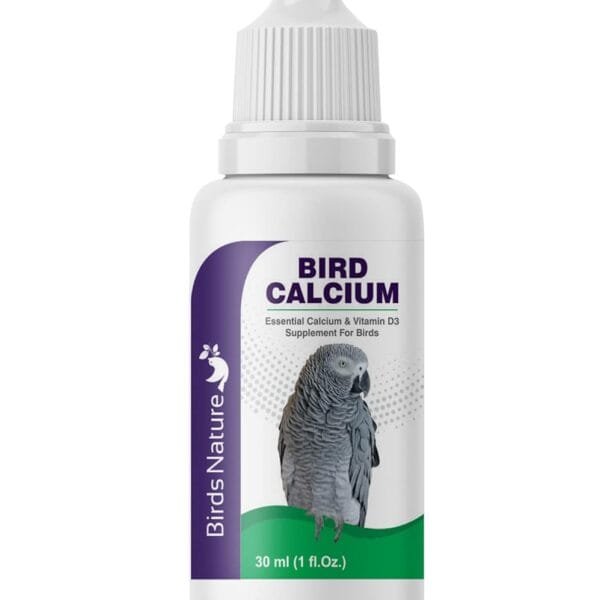Senegal Parrot
About Senegal Parrots:
Known as the “pocket parrots” of Africa, Senegal Parrots (Poicephalus senegalus) pack big personalities into small bodies. These intelligent, 9-inch parrots are prized for their quiet demeanor and exceptional mimicry skills. Unlike louder parrot species, Senegals tend to form deep bonds with one person while remaining tolerant of other household members. Their distinctive “V-shaped” green, yellow, and orange belly feathers make them easily recognizable. While not as flashy as some tropical parrots, their playful antics and ability to learn phrases clearly have won them a devoted following among bird enthusiasts.
| ESSENTIAL FACTS | |
|---|---|
| Scientific Name | Poicephalus senegalus |
| Size/Weight | 9 inches | 120-170g |
| Lifespan | 25-30 years (up to 50 with exceptional care) |
| Native Range | West Africa (Senegal to Nigeria) |
| IDENTIFICATION | |
| Colors |
• Gray head • Green wings/back • V-shaped yellow/orange belly |
| Subspecies |
1. P.s. senegalus (yellow belly) 2. P.s. versteri (red-orange belly) 3. P.s. mesotypus (pale orange belly) |
| Eye Color | Yellow (adults), dark gray (juveniles) |
| DIET | |
| Base Diet | 60% pellets, 25% vegetables, 15% fruits/seeds |
| Recommended Foods |
• Sweet potatoes • Mango • Palm nuts (natural foraging food) • Sprouted legumes |
| Avoid | Avocado, chocolate, caffeine, alcohol |
| HOUSING | |
| Cage Size | Minimum 24″W × 24″D × 30″H (bar spacing: 5/8″) |
| Essential Features |
• Multiple horizontal bars for climbing • Wooden sleeping hut • Foraging trays |
| Toys |
• Leather chew strips • Puzzle feeders • Wood blocks (soft pine) |
| BEHAVIOR | |
| Personality |
• Quiet but mischievous • Excellent mimic (clear speech) • “One-person” bird tendency |
| Activity Pattern | Most active dawn/dusk (crepuscular) |
| Social Needs | 1-2 hours focused interaction daily |
Did You Know?
Senegal Parrots have a unique “blushing” behavior where their facial feathers puff up when excited or content – look for this when they’re enjoying head scratches! Their exceptional problem-solving skills mean they can master complex foraging puzzles that frustrate larger parrots.
Care Tip:
Provide plenty of wooden toys – Senegals need to chew to maintain beak health but lack the destructive power of larger birds. Rotate puzzle toys weekly to prevent boredom.

Showing all 3 results
Showing all 3 results
Senegal Parrot Care Schedule
These intelligent West African parrots thrive on routine. Their moderate size (9 inches) and quiet nature make them ideal apartment birds, but they require consistent mental stimulation to prevent boredom. Follow this schedule to keep your Senegal healthy and engaged.
| DAILY CARE ESSENTIALS | ||
|---|---|---|
| Morning Routine |
• Fresh water (change twice daily) • Breakfast: 1 tbsp pellets + chopped veggies • 15-minute training session (recall, tricks) | ⏱️ 30 min |
| Evening Routine |
• Dinner: foraging toy with nuts/fruits • 1-2 hours out-of-cage socialization • “Blushing” check (puffed facial feathers = happy) | ⏱️ 2+ hours |
| WEEKLY CARE TASKS | ||
| Cage Maintenance |
• Full substrate change • Scrub perches with vinegar solution • Disinfect food/water dishes | ⏱️ 45 min |
| Enrichment Update |
• Rotate 3-4 puzzle toys • Introduce new wooden chew blocks • Rearrange cage perches | ⏱️ 20 min |
| MONTHLY CARE CHECKLIST | ||
| Health Audit |
• Weigh bird (healthy range: 120-170g) • Inspect nails/beak (trim if needed) • Check for feather stress bars | ⏱️ 25 min |
| Environment Refresh |
• Deep clean play gyms/stands • Replace UV bulbs (if using) • Check room humidity (40-60% ideal) | ⏱️ 1 hour |
Senegal-Specific Care Tips:
- Daily: Offer a “quiet hour” in evenings – Senegals appreciate downtime after dusk activity.
- Weekly: Use shredded paper for foraging – mimics their natural nesting behavior.
- Monthly: Record weight every 4 weeks – Senegals are prone to obesity.
Why This Schedule Works:
Senegal Parrots are intelligent but sensitive. This routine balances their need for mental stimulation (puzzle toys, training) with their crepuscular nature (active dawn/dusk). The weekly perch rearrangements prevent territorial behavior, while monthly weight checks help detect health issues early – crucial for a species that hides illness well.
Warning Signs:
⚠️ Contact an avian vet if: Your Senegal stops chewing toys, shows reduced “blushing,” or sleeps excessively during peak activity times.








